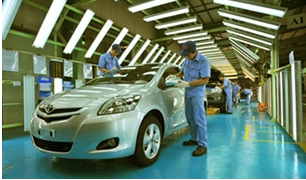Japan keen on investing in Vietnam
Japan is Vietnam’s strategic partner in a wide range of fields and largest bilateral official development assistance (ODA) donor, which accounts for 30 percent of its total ODA loans.

Japan is also one of the five biggest investors in Vietnam with its registered capital making up 11 percent of the total amount of foreign direct investment (FDI) in the country.
It was supposed that Japan would reduce its foreign investment after being severely hit by the earthquake and tsunami in March. However, economic experts argued that in order to restore production and business, Japan’s investment capital should flow into foreign markets to gain long term interests.
Vietnam in focus
According to the Japan Bank for International Cooperation (JBIC)’s survey of the 2010 fiscal year, Vietnam ranked third among the countries with promising foreign trade prospects in the medium term and fourth in the long term.
Hideo Naito, JBIC Head of the Europe, Middle East and Africa Finance Department, said the low labour cost, rapid growth of the domestic market, skilled workforce and diversified investment options to reduce risks are main reasons for Vietnam’s attraction to foreign businesses.
Kohei Osada, Nikkei Senior Managing Director, said the number of Japanese businesses investing in Vietnam rose sharply from 200 in 2005-2006 to 1,000 in 2010.
A recent survey conducted by the Japanese Ministry of Economics, Trade and Industry (METI) showed that 97 percent of businesses in the industrial sector had decided to import accessories from the Asian region.
N. Hasegawa, Editor-in-Chief of the Nikkei Economic Times, said that Japanese investors had to find other markets including India, Indonesia and Vietnam for fear of economic instability in China.
Over 60 percent of Japanese businesses considered Vietnam as the most attractive destination. Some large corporations like Honda and Toyota have expanded the scale of operation in the country, he added.
The shrinking domestic market and the weak competitiveness caused by the appreciation of the Yen have forced Japanese businesses to move their production to foreign countries. “If Vietnam was well prepared it could soon receive the third wave of investment from Japan,” said Tran Tuan Anh, Vietnam’s Deputy Minister of Industry and Trade (MoIT).
Stronger reform in need
Yamaoka, Chief Representative of the Japan Trade Promotion Organization (JETRO) said Japanese businesses are confronted with some difficulties while operating in Vietnam due to the rising rate of inflation and the depreciation of the Vietnam Dong. These are considered normal in a developing country. But in Vietnam they occur all of a sudden, even four times quicker than in other ASEAN countries, which put businesses at a loss what to do.
Hideo Naito cited other difficulties such as poor infrastructure, lack of managers and complex legal system in Vietnam.
Japan is focused on investing in automobile industry, machine manufacturing, electric and electronic equipment and chemical production in Vietnam. It is planning to shift to support and high-tech industries in the coming time.
(VOV)

